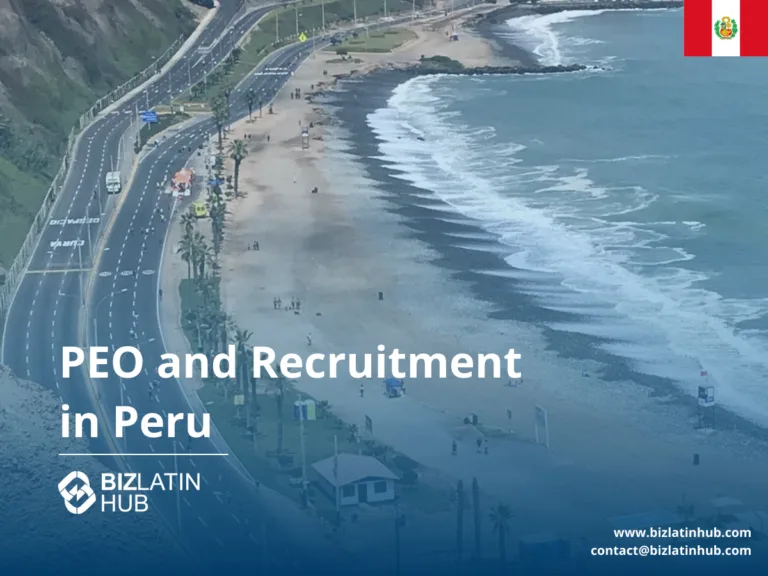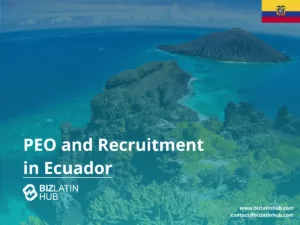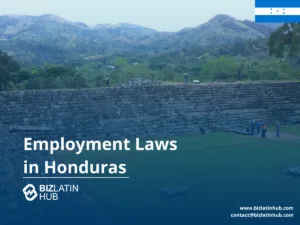A Professional Employer Organization (PEO) in Peru is a helpful tool for testing market entry and establishing your business successfully. By managing critical HR functions, a PEO enables you to focus on starting operations while navigating Peru’s legal and operational complexities. Collaborating with a trusted local partner is essential, and Biz Latin Hub delivers expert support with its extensive experience across Latin America. From market entry to company formation in Peru, we offer the services needed to help your business succeed in Peru and the wider region.
Key Takeaways
| Is it legal to hire in Peru through PEO services? | Yes, hiring through a PEO in Peru is legal. The employment laws of Peru will apply to all employees hired through this means. |
| What are the benefits of hiring through an PEO in Peru? | Choosing PEO services in Peru provides quick access to the market without the need to establish a local entity, letting you focus on scaling-up. |
| Steps to hire through a PEO in Peru | Sign an agreement with the third-party provider (EOR). Confirm the employment offer for the candidate. Send the employment offer to the candidate. Once the candidate accepts the offer, the EOR prepares the employment contract, acting as the employer of record. The candidate reviews and signs the employment contract. The EOR, as the employer of record, completes all mandatory employee registrations in Peru. The employee begins work and reports to the hiring foreign company. |
| Why employ Peruvian workers? | Peruvian work culture is vibrant and known for its strong ethic. People in Peru are also embracing hybrid and remote work with companies recognizing the boost in productivity and the flexibility it offers. |
What to Expect From a PEO, or Professional Employer Organization in Peru?
A PEO, or professional employer organization in Peru will seek, hire, and onboard staff on the behalf of a client, as well as managing their payroll. That means, depending on the profile of the staff being sought, the client can have local workers in the space of a few weeks or even days.
Officially, they will be employees of the PEO or professional employer organization, but they will report directly to the client, who will retain full control over their schedules and workloads. As such, they will effectively act as employees of the client.
In providing PEO payroll company services in Peru, the provider will oversee the salaries and other administrative matters, generally charging the client on a per employee basis.
That fee will often work out to be less than the cost of going through company formation and subsequent liquidation, and it comes with the convenience of having a complex administrative and compliance matter covered by a third-party provider with proven expertise.
Meaning that when you partner up with a PEO, or professional employer organization in Peru, you enjoy the benefit of guaranteed compliance with all relevant aspects of commercial, employment, and labor law.
REAL-LIFE EXAMPLE: A US company is looking to hire a bilingual software developer. They decide that a Peruvian employee may be a good option (having a high level of education, often being bilingual and costing less than a US employee). However, the US company does not want to go through the administrative hassle of forming a local company in Peru. Instead, they work with an Peruvian PEO service provider who can ‘hire’ the individual, and comply with all local employment requirements. While the employee is technically employed by the PEO, they will be directed by the US company.
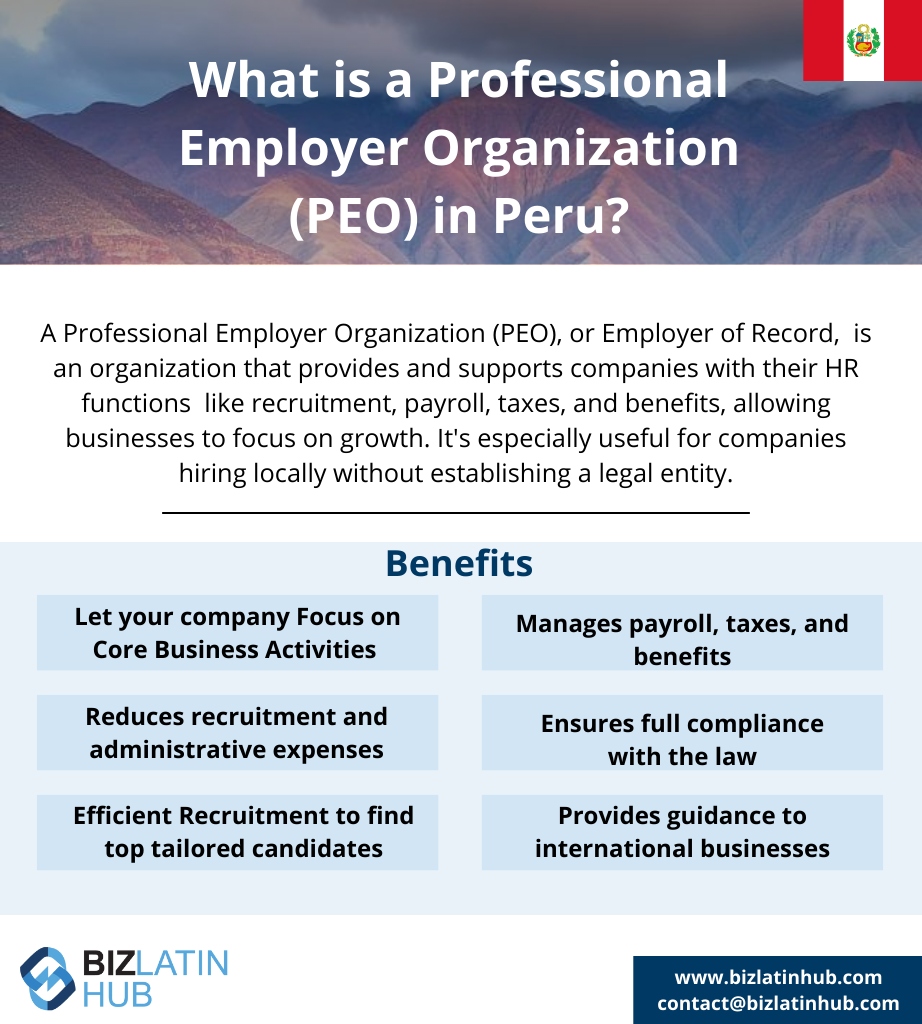
How to Partner With an Professional Employer Organization in Peru?
To partner with a PEO, the hiring company signs a contract with a third-party organization, designating them as the professional employer of record (EOR) for the staff members they wish to hire in Peru. This means that, on official documentation in Peru, the third-party organization (the PEO/EOR) assumes responsibility for complying with all employment regulations for the staff member.
This arrangement allows the foreign company to avoid the complexities of understanding and adhering to Peruvian employment laws on its own. Consequently, the foreign company reduces its risk of non-compliance and can direct its focus toward business development and market growth in Peru.
The process of hiring an employee through an employer of record in Peru is straightforward. Below is an outline of the steps involved:
- Sign an agreement with the third-party provider (EOR).
- Confirm the employment offer for the candidate.
- Send the employment offer to the candidate.
- Once the candidate accepts the offer, the EOR prepares the employment contract, acting as the employer of record.
- The candidate reviews and signs the employment contract.
- The EOR, as the employer of record, completes all mandatory employee registrations in Peru.
- The employee begins work and reports to the hiring foreign company.
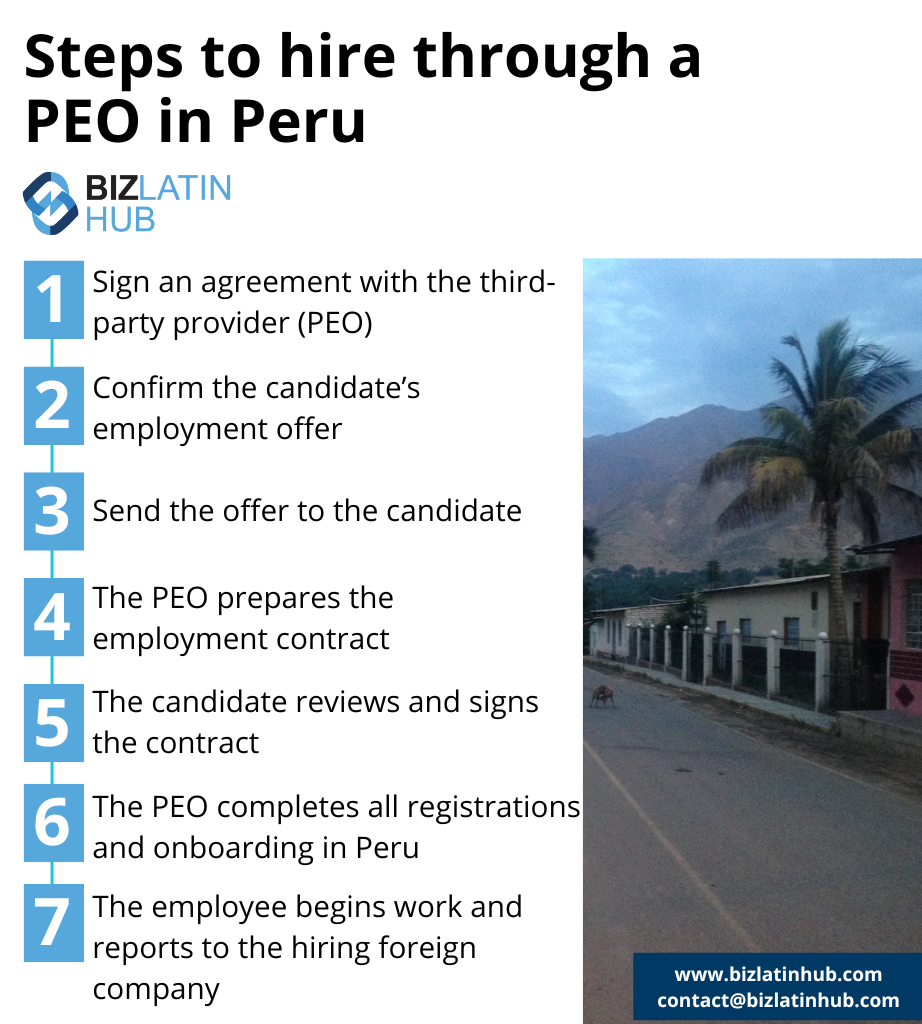
Compliance Issues Handled by a Professional Employer Organization in Peru
In Peru, companies must guarantee their employees several statutory obligations. Managing this process and ensuring compliance can be time-consuming. When you work with a PEO, or professional employer organization in Peru, they will implement these HR functions. This is a list of some of the statutory obligations related to maintaining employees that a PEO firm will assume responsibility for:
- Working Hours: The standard workweek is eight hours per day, with a maximum of 48 hours per week.
- Bonuses: In Peru, employees are entitled to a ’13th’ and ’14th’ salary, bonuses each equal to a month of salary and usually distributed in July and December.
- Vacation leave: Employees are entitled to 30 days of paid vacation leave per calendar year, of which 15 must be taken as holiday and the rest can be cashed out.
- Sick Leave: Employers are obliged to pay the first 20 days of doctor-authorized sick leave, after which it is covered by the public health provider Essalud.
- Parenthood leave: In Peru, labor law allows for paid maternity leave totaling 98 days, made up of 49 days before the due date and 49 days after. In the case of paternity leave, new fathers are entitled to 10 consecutive days of paid leave.
- Terminations: In the event an employee has their contract terminated, unless the reason was misconduct, they will be entitled to severance payments on top of any outstanding salary, which the PEO payroll company in Peru will calculate and oversee the payment of.
PEO vs. EOR in Peru – What’s the Difference?
When expanding into Peru, businesses often choose between a Professional Employer Organization (PEO) or an Employer of Record (EOR) to hire and manage employees.
- PEO (Professional Employer Organization): A service provider that supports companies with a local entity establishment and then managing payroll, benefits, and HR compliance. While entity setup requires initial time and investment, it offers greater stability, talent attraction, ability to build a long company culture and reduced permanent establishment risks.
- EOR (Employer of Record): A third-party provider that legally hires employees for companies, handling payroll, taxes, and compliance. It enables quick market entry without a local entity but may have limitations for long-term operations. EOR services are legal in Peru, with all employment laws of Peru applying to employees hired through this means.
Note that PEO and EOR are often used interchangeably and, in some cases, may even mean the same thing, as their meanings can vary depending on context, local legal frameworks, and business local norms.
Important Tip: While an EOR provides a quick-entry solution, establishing a legal entity and working with a PEO typically offers greater control, long-term cost efficiency, reduced permanent establishment risk, stronger legal standing, and better talent attraction in Peru. Biz Latin Hub offers both PEO and EOR solutions, helping businesses navigate Peru’s regulations, establish entities, and ensure full HR compliance. Whether you need a fast market entry or a stable long-term presence, we can guide you through the process.
How to Use a Payroll Calculator
If you want to get an idea of the possible costs involved in payroll outsourcing in Peru, using a payroll calculator is one way to get a good estimate.
Although a payroll calculator won’t be completely accurate, it will give you the opportunity to evaluate options while varying the salary, the number of employees, the country you want to enter, and the currency you wish to work in. As such, you will be able to understand your likely costs across a range of salaries, while also being able to compare other countries as potential alternative destinations.
You can find the BLH payroll calculator at the bottom of our Hiring & PEO Services page. The calculator will allow you to make good estimations of the costs involved in hiring in Latin America and the Caribbean based on country, currency, and salary, with the calculator factoring in local statutory deductions.
To use the BLH payroll calculator, you will need to undertake the following steps:
- Step 1: Select the Country.
- Step 2: Select the currency you with to deal in.
- Step 3: Indicate and employees monthly income.
- Step 4: Calculate your estimated costs.
- Step 5: Compare your costs to other options.
Step 1: Select the country
Choose the country where you are doing business, or planning to launch. This feature will be useful when it comes to comparing potential alternative markets.
Step 2: Select the currency you wish to deal in
You can choose between US dollars (USD), British Sterling (GBP) and Euros, as well as the local currency for the country you are looking at, compared to what is most convenient for you. Note that for Ecuador, El Salvador, and Panama, the local currency is also USD, as they have dollarized economies.
Step 3: Indicate an employees monthly income
Here you can indicate the expected salary you will be paying an employee, in the currency of your choice.
Step 4: Calculate your estimated costs
Based on all of the information you have provided, you will receive results indicating your estimated costs, including a breakdown for estimated statutory benefits you will be liable for.
Step 5: Compare your costs to other options
With a good estimate at hand of how much your staff in Peru would be, if you are flexible about your expansion into Latin America and the Caribbean, you can use the BLH payroll calculator to compare those costs to other jurisdictions.
FAQs on hiring through a PEO, or professional employer organization in Peru
Based on our extensive experience, these are the common questions and doubts of our clients on hiring through an PEO in Peru:
1. How does one hire employees in Peru?
You can hire someone in Peru by either setting up your own legal entity in the country and using it for recruitment, or by utilizing the services of an employer of record (EOR). An EOR, which is a third-party entity, allows you to employ individuals in the country while they act as the official employer before the law. When using an EOR, you do not need a Peruvian local entity to hire employees.
2. What is in a standard employment contract in Peru?
A standard Peruvian employment contract should be written in Spanish (and can also be in English) and contain the following information:
- ID and address of the employer and employee.
- City and date.
- Location where the service will be provided.
- Payment frequency.
- Social benefits.
- Probation period.
- Work hours.
- Specific agreements or pacts.
- What are the mandatory employment benefits in Peru?
- Social Security Contributions (health, pension, and occupational risk).
- CTS (Compensation for Time of Service).
- Vacation.
- Family Allowance (if applicable).
- National Holidays Bonus.
- Christmas Bonus.
- Profit Sharing (if applicable to the sector).
3. What are the mandatory employment benefits in Peru?
- Social security contributions (health, pension, and occupational risk).
- CTS (Compensation for time of service).
- Vacation.
- Family allowance (if applicable).
- National holidays bonus.
- Christmas bonus.
- Profit sharing (if applicable to the sector).
4. What is the total cost for an employer to hire an employee in Peru?
The total cost for an employer to hire an employee in Peru varies depending on the salary. However, as an indication, the employer cost for mandatory employment benefits is 30% to 40% of the gross employee salary, on top of the employee’s gross salary.
Please use our Payroll Calculator to calculate employment costs.
5. Does the EOR legally employ your employees?
The total cost for an employer to hire an employee in Peru varies depending on the salary. However, as it’s important to know if the provider manages local employment in Peru. Having a local employer is crucial, as they handle tasks like maintaining a local entity, registering with tax authorities, payroll processing, tax filing, benefits, and HR compliance. Additionally, the provider must maintain proper corporate governance for all their companies.
6. Does the EOR provide payroll compliance and guidance for Peru?
You do need to ensure that the EOR can provide its services in Peru. It is also worth checking which other countries they operate in. Not all providers have global advisory services. Hiring one with such services eliminates the need for multiple consultants to manage compliance in all your countries of operation.
7. How does the employment contract work?
When working with an employer of record (EOR), the contractual handling of the employment relationship is crucial. The EOR serves as the legal employer and needs a contract with the worker, which may or may not include your company. The agreement must be compliant with the law and aligned with your company’s practices across all locations the EOR supports.
Contracts vary across territories. Some have detailed tripartite agreements, clearly defining responsibilities, with the EOR handling payments, taxes, and local matters, while you retain policy control. Benefits and statutory requirements should be discussed. When choosing an EOR, examine their template agreements for consistency and consider how they ensure uniformity while complying with local practices.
8. Does the EOR possess in-depth payroll and HR expertise?
For effective multi-country HR and Payroll support, the Employer of Record needs extensive international payroll and HR expertise, as well as a good understanding of local employment and tax laws. Look for evidence of robust processes and comprehensive guides to simplify information.
During the sales or onboarding process, speak to those responsible for employment compliance and assess their depth of knowledge and understanding of your challenges. Inquire about written guides for your convenience, as this shows their investment in supporting customers with local regulations.
9. What is the employment model they use in Peru?
Employers of record often keep their local employment practices in different countries undisclosed. However, understanding these practices is essential due to significant legal differences. Some countries allow unlimited EOR models, while others have time or job function limitations. Compliance with these limitations is mandatory, as violating local laws can lead to serious consequences.
Why Choose to Invest in Peru?
Peru is perhaps best known as an investment destination because of the opportunities available in the mining sector, with the country sitting on large reserves of copper and gold. By 2021, investment in the mining sector alone hit $5.24 billion (all figures in USD).
Peru is also a major trade hub. The port of Callao has one of the highest container throughputs in Latin America, and it’s just one of three major ports serving the Pacific Ocean. In 2021, Peruvian exports hit new records, with agro-export companies among the fastest growing.
Peru’s trade credentials are boosted by its status as a founding member of the Pacific Alliance — an economic association including Chile, Colombia, and Mexico, and to which Ecuador has formally applied to join.
In late 2021, the Pacific Alliance demonstrated its long-rumored interest in expanding into Asia-Pacific when Singapore was inaugurated as an associate member. Australia, Canada, New Zealand, and South Korea have been named as potential candidates for similar status in the future.
Alongside its neighbors Bolivia, Colombia, and Ecuador, Peru is also a founding member of the Andean Community of Nations (CAN), a more than half century old regional integration initiative, which has continued to implement a range of integration measures in recent years-
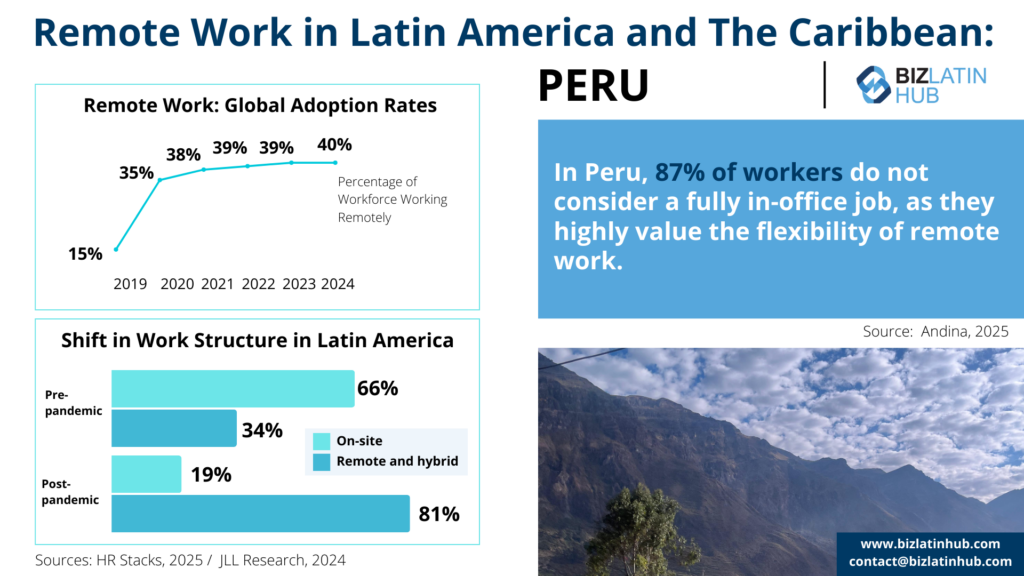
Biz Latin Hub Can Be Your PEO, or professional employer organization in Peru
At Biz Latin Hub, we provide integrated market entry and back-office services throughout Latin America and the Caribbean, with teams in 17 major cities throughout the region and trusted partners in the markets where we are not present. That makes us an ideal partner to support multi-jurisdiction market entries and cross-border operations.
Our portfolio includes accounting & taxation, company formation, due diligence, hiring & PEO, and corporate legal services. If you are looking for a PEO payroll company in Peru, we can help you.
Contact us today to find out more about how we can assist you.
If you found this article on hiring through a professional employer organization in Peru of interest, you may want to check out the rest of our coverage of this South American country. Or read about our team and expert authors.

